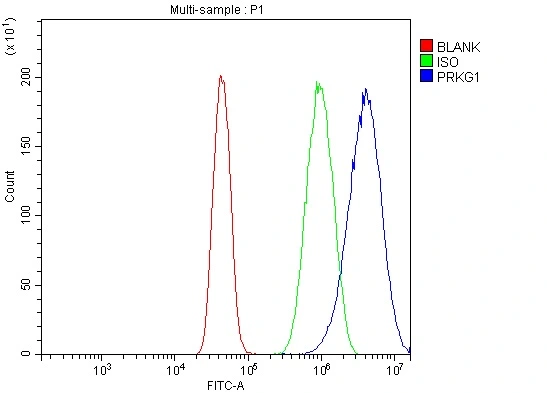cGK1 antibody
GTX111610
ApplicationsWestern Blot
Product group Antibodies
ReactivityHuman, Mouse
TargetPRKG1
Overview
- SupplierGeneTex
- Product NamecGK1 antibody
- Delivery Days Customer9
- Application Supplier NoteWB: 1:5000-1:20000. *Optimal dilutions/concentrations should be determined by the researcher.Not tested in other applications.
- ApplicationsWestern Blot
- CertificationResearch Use Only
- ClonalityPolyclonal
- Concentration1 mg/ml
- ConjugateUnconjugated
- Gene ID5592
- Target namePRKG1
- Target descriptionprotein kinase cGMP-dependent 1
- Target synonymsAAT8, PKG, PKG1, PRKG1B, PRKGR1B, cGK, cGK 1, cGK1, cGKI, cGKI-BETA, cGKI-alpha, cGMP-dependent protein kinase 1, protein kinase, cGMP-dependent, regulatory, type I, beta, protein kinase, cGMP-dependent, type I
- HostRabbit
- IsotypeIgG
- Protein IDQ13976
- Protein NamecGMP-dependent protein kinase 1
- Scientific DescriptionMammals have three different isoforms of cyclic GMP-dependent protein kinase (Ialpha, Ibeta, and II). These PRKG isoforms act as key mediators of the nitric oxide/cGMP signaling pathway and are important components of many signal transduction processes in diverse cell types. This PRKG1 gene on human chromosome 10 encodes the soluble Ialpha and Ibeta isoforms of PRKG by alternative transcript splicing. A separate gene on human chromosome 4, PRKG2, encodes the membrane-bound PRKG isoform II. The PRKG1 proteins play a central role in regulating cardiovascular and neuronal functions in addition to relaxing smooth muscle tone, preventing platelet aggregation, and modulating cell growth. This gene is most strongly expressed in all types of smooth muscle, platelets, cerebellar Purkinje cells, hippocampal neurons, and the lateral amygdala. Isoforms Ialpha and Ibeta have identical cGMP-binding and catalytic domains but differ in their leucine/isoleucine zipper and autoinhibitory sequences and therefore differ in their dimerization substrates and kinase enzyme activity. [provided by RefSeq, Sep 2011]
- ReactivityHuman, Mouse
- Storage Instruction-20°C or -80°C,2°C to 8°C
- UNSPSC12352203


![IHC-P analysis of kidney tissue using GTX83811 PRKG1 antibody [9G4]. Antigen retrieval : Heat-induced epitope retrieval by 10mM citrate buffer, pH6.0, 100oC for 10min. Dilution : 1:50](https://www.genetex.com/upload/website/prouct_img/normal/GTX83811/GTX83811_1856_IHC-P_w_23061420_163.webp)
![FACS analysis of Jurkat cells using GTX83812 PRKG1 antibody [9A4]. Red : Primary antibody Blue : Negative control antibody](https://www.genetex.com/upload/website/prouct_img/normal/GTX83812/GTX83812_187_FACS_w_23061420_897.webp)

